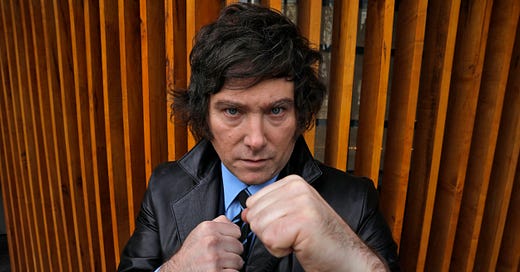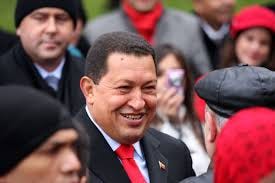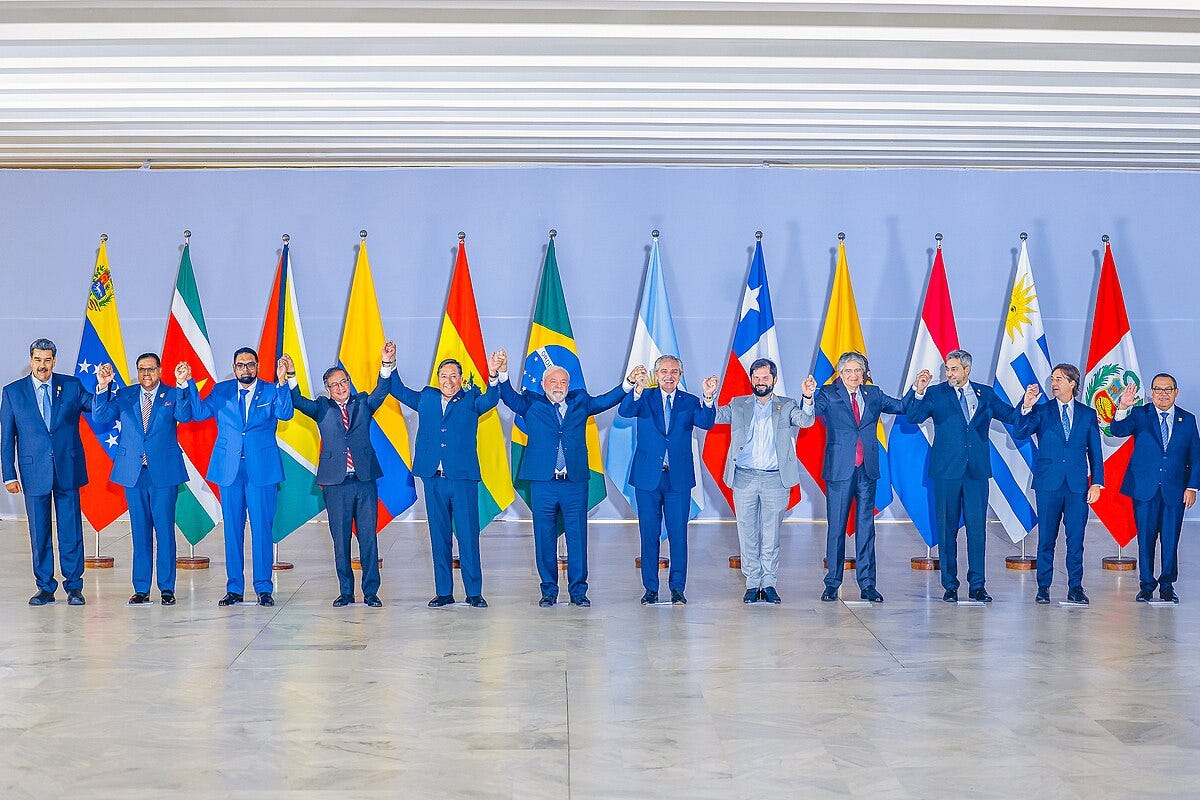Javier Millei, The Venezuelan Annexation Of Guyana's Territory, And South American Populism
It seems like every day something novel occurs in the South American continent. Let’s make sense of it’s biggest political motivator.
Javier Milei is the new Argentinian president-elect after an election which took place in October. Since his election american media has found significant interest in this latin American political figure because of his right wing views which seem to mirror the Trump platform. The Milei iceberg goes a lot deeper than this however, as he also claims to take political advice from his english mastiff dogs and has hailed Al Capone as a hero. To put it simply Milei is a very interesting person. I encourage you to google his name and read the wave of various articles calling him everything from a right wing authoritarian to a radical libertarian. At this time it's hard to tell what policies Milei will implement exactly. On top of this the nation of Venezuela has voted to annex a portion of Guyana. Although the international community has blocked this referendum claiming it holds no international merit, the Venezuelan government still believes the referendum is binding. I want to talk through the waves of populism which led to this point and the current wave we seemed to be in. If you wish to skip the historical context, the South American situation is explained after the header: The modern populist position.
Argentinian president Javier Millei
Credit: AP
A little bit of context
Milei was elected into an impoverished nation rife with inflation and populism provided a way for him to blame someone. Populism is not a solution, It's a tool. To put it simply, populism is a generic tag for anything that creates two categories (the people and the elites) and claims the elites do not align with the people's interest. This anti-establishment tag does not represent one ideology and can come from anywhere on the political spectrum as we will see. For example both former president Trump and Chinese president Xi Jing Ping are populists. With that out of the way, let's get into some history.
There have been several waves of South American populism. The first wave was characterized by anti-imperialist dictators and lasted from 1929 to about 1960 . The two main figures from the first wave were Getulio Vargas and Juan Peron. Vargas was both the 14th and 17th president of Brazil from 1930 to 1945 and from 1951 to 1954. After coffee prices in Brazil dropped in 1929 the four decade old oligarchy was violated by the standing president as he nominated his successor from the wrong province. This prompted Vargas to run a campaign of moderate social reform and the reduction of imports and investments from other countries also referred to as economic nationalism. In the election of 1930 he lost, but after the revolution of 1930 he assumed unlimited power. He brought some hope to poor Brazilians who lacked representation. In 1933 he held a constitutional convention and Drafted the constitution of 1934. He provided an expansion of voting rights. This didn't mean that his presidency was always positive. In 1937 he led a coup against his own government for absolute power. On December 2nd he outlawed all political parties. The presidency of Peron was very similar seeing him come to power in 1946 on a platform of social welfare and economic independence. Peron was also very popular, seeing him win reelection with a margin of 30%. Unfortunately, he also practiced dictatorial powers and suppressed opposition. As his second term came to an end the political climate of Argentina became more polarized than ever, and giving refuge to former nazis didn't help anything. This set the stage for instability across the South American continent.
The Military Mandated Intermission was the peak of South American political instability. Only 8 countries did not experience a military coup during this period from 1960 to the early 1980s. The nations that did not experience instability typically held steadfast to the ideologies they entered this period with. While populism still existed and was practiced in South America, no significant populist leaders defined these turbulent decades. This period was important for its influence on the second wave.
The second wave of populism lasted from 1990 to the early 2000s. Much like the first wave of populism the two main leaders came from Brazil and Argentina, Carlos Menem and Fernando Collor de Mello respectively. Interestingly enough former president Carlos Menem of Argentina was a self proclaimed Peronist, aligning his policy with former president Juan Peron. His Brazilian counterpart was not as equally aligned to the former populist president Vargas. Although he was democratically elected, he left the presidency after allegations of corruption. This period typically focused on economic policy. More specifically they focused on the lowering of state influence in the economy. This period was important because it opened up South America for continuous democracy and led South American nations to align more with western ambitions. They also drew closer to the US diplomatically.
I understand my hypocrisy here. I said I would be talking about south american populism and Argentina and Brazil aren't the only south american countries. This was done on purpose. Both Argentina and Brazil have dominated South america. This is thanks to their size and economic strength. The political sphere of these two countries were emulated by their neighbors to a more minor degree until the year 1999 when the north south american country of Venezuela decided it was time for a turn to the left. During the oil crisis of the 1970s, many nations needed a new country to buy oil from Venezuela to fill this void. As Venezuela got richer oil barons started to take control of politics. The people knew of their massive control on the state, but were satisfied due to the abundance of social welfare programs. In the 1980s oil prices started to decline and social welfare programs needed to be cut. There were multiple coups, but in 1999 Hugo Chavez finally came to power with a brand new agenda. Chavez was a radical socialist who loved to champion the people. He had many broadcasts on national television where he took the people's suggestions for change and implemented them for popular support. However, he also suppressed dissidents sometimes with violence. His rise to power echoed across the continent as left wing politicians were elected to many major posts.
Hugo Chavez, former president of Venezuela
Credit: Brittanica
The modern populist position
Usually this is the end of the progression for populism in South America with its conclusion in left wing policies, but with recent events unfolding in the continent, I’m confident we are in a fourth wave of South American populism. What corroborates this theory is the spread of similar ideas which seem to be running wild. There are several parts to a modern South American populist. A conservative economic stance and a self focused national identity. There are three events which connect to this idea: the loss for Jaír Bolsonaro, the victory for Javier Millei, and the referendum by Venezuela to annex part of Guyana.
After the loss of Jaír Bolsonaro in the presidential election of Brazil, hundreds stormed government buildings. This event was similar to January 6th in almost every way. Motivated by the loss of a prominent populist official, his supporters stormed the “hub of the elites”.
Javier Millei was elected in a very similar core position as Bolsonaro: to make their respected nation great. For Javier, this means making Argentina economically dominant and drawing closer to the United States.
As for foreign policy, no action embodies this better than the recent move by Venezuela to annex 70% of Guyana's land mass. Nicolás Maduro is a chavismo, taking his ideology from Hugo Chavez. He is also heavily invested in making Venezuela great. The nation as a whole believes the Oil rich portion of their neighbor is rightfully theirs as shown through the referendum they voted on.
On top of these events, other nations like Ecuador and Peru have both experienced a political crisis, likely due to the populist influences in their respective governments.
South American leaders at the 2023 South American Summit
Credit: Ricardo Stuckert
What this means for South America
While populism can reform a political system to better fit the needs of the people, this is not the trend we have seen before. What populism likely means is strong leaders whose government is set up to give them unlimited power. All this means is the collapse of any true democracy and an eventual power vacuum which is felt throughout the country.
This is not a very positive outlook, but every nation has a chance to surprise. The 4th wave is a great way for the South American countries to test their governments checks and balances, and they might even be able to prevent the negatives of populism.
Will democracy prevail in South America?
Credit: Reuters
In conclusion….
If you want to learn more about South America or anywhere else for that matter, check out the rest of my blog and consider subscribing. I wrote separate articles which go into a little more detail on the events I discussed. If you want a list of my sources on any of my articles, email me. I don’t include them here to prevent overstretching a posts length. Thanks for reading!







